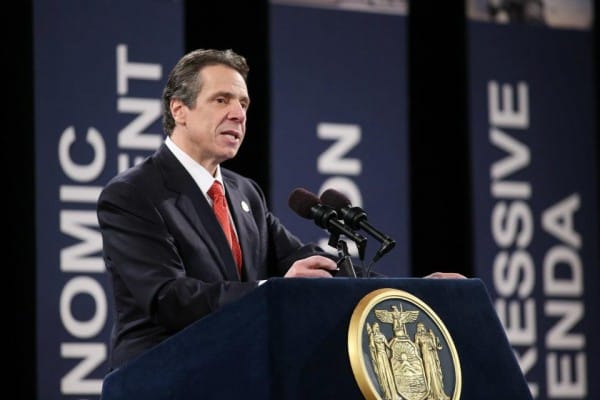Advocates Optimistic About NY Public Election Funding Despite Failure

Credit: Governor Cuomo's Facebook Page

New York Governor Andrew Cuomo's proposition on campaign finance was meant to serve as a catalyst to the reform process, which is supported by 79 percent of state's voters. However, neither Cuomo’s proposed bill nor the final product managed to pass through the state Senate; but, there’s still hope for the future.
During a State of the State address back in January, Cuomo promised to work with the state’s Legislature to bring forth tangible campaign finance reform to combat corruption within New York politics and reduce the role of big interest groups and large donations in campaigns.
Early in the month, as the state Senate’s legislative session wound down amid heated debate over reform, Cuomo finally fulfilled his promise and introduced his own bill with a number of provisions aimed toward his proposed goals.
Hundreds of protesters were active across New York in recent weeks while the debate over campaign reform continuously stalled in Senate sessions. All Senate Republicans voted against the bill.
The issue has been prominent in the state’s media, with a recent barrage of television and radio advertisements funded by the Friends of Democracy super PAC--one of the most important forces behind the movement.
“Governor Cuomo’s support is crucial to the reform effort," said Ian Vandewalker, a campaign reform expert at the Brennan Center for Justice. “Although his bill didn’t move in the legislature, it lays out useful policy options. It’s good to have people in Albany talking about policy options and negotiating what will work best for New York.”
New York historically has one of the greatest disconnects between voters and state officials given the erroneously large cap on individual donation limits, the highest of any state that places limits on individual contributions. New York individuals are permitted to give up to $60,800 for primary and general elections for statewide office candidates (over 10 times the limit to presidential candidates) -- 16,800 for State Senate candidates and $8,200 for Assembly candidates.
The state currently lacks any system of public financing, which greatly limits the potential for challengers to raise enough money to compete against incumbents. New York’s candidates tend to rely far more on large donors than candidates in other states.
As Cuomo’s statement in support of his proposed bill notes:
“In 2010, on average only 6% of aggregate individual contributors received by candidates for state offices were for amounts of $250 or less, and in no other state did a smaller percentage of the total population contribute to political campaigns (0.5%).”
Cuomo’s bill, along with two others introduced during the legislative session, all included a number of key provisions tailored to combat these issues, along with the corruption that has historically plagued New York politics.
“They all had a voluntary system providing a six-to-one multiplying match for small donations to qualified candidates, reporting for independent spending, robust and independent enforcement of the campaign finance laws at the Board of Elections, and lowered contribution limits,” said Vandewalker.
The six-to-one public small donor matching system is already used in New York City, where candidates can opt-in to the public program which provides them six federal dollars for every privately-donated dollar. The opt-in would allow a far greater level of competition for politicians unable to receive support from big donors and interest groups, simultaneously placing voters closer to their politicians.
If candidates choose the opt-in route, the limits on individual donations would be even tighter.
While reform did not pass this session, there is good reason to believe that New York’s electoral system will have a new look before the next election.
"We have a very strong and broad coalition made up of good government groups, business and civic leaders, labor, environmental activists and other progressives, and we won’t stop working for fundamental reform,” said Vandewalker.



